2022中考英语一轮复习PPT课件 第3课时 Units 1—6,Book 7B
文档属性
| 名称 | 2022中考英语一轮复习PPT课件 第3课时 Units 1—6,Book 7B |  | |
| 格式 | ppt | ||
| 文件大小 | 900.5KB | ||
| 资源类型 | 试卷 | ||
| 版本资源 | 通用版 | ||
| 科目 | 英语 | ||
| 更新时间 | 2022-06-01 15:06:18 | ||
图片预览

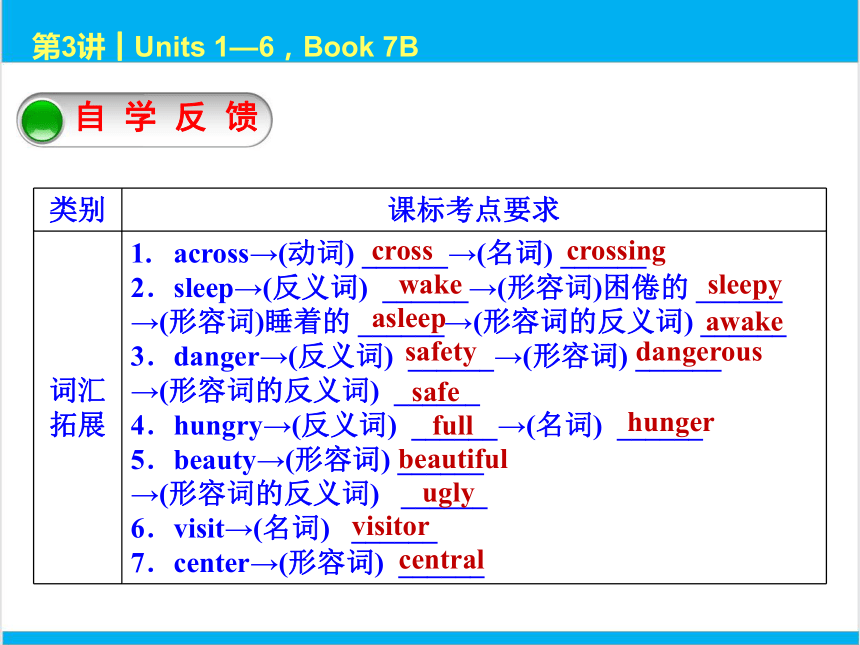
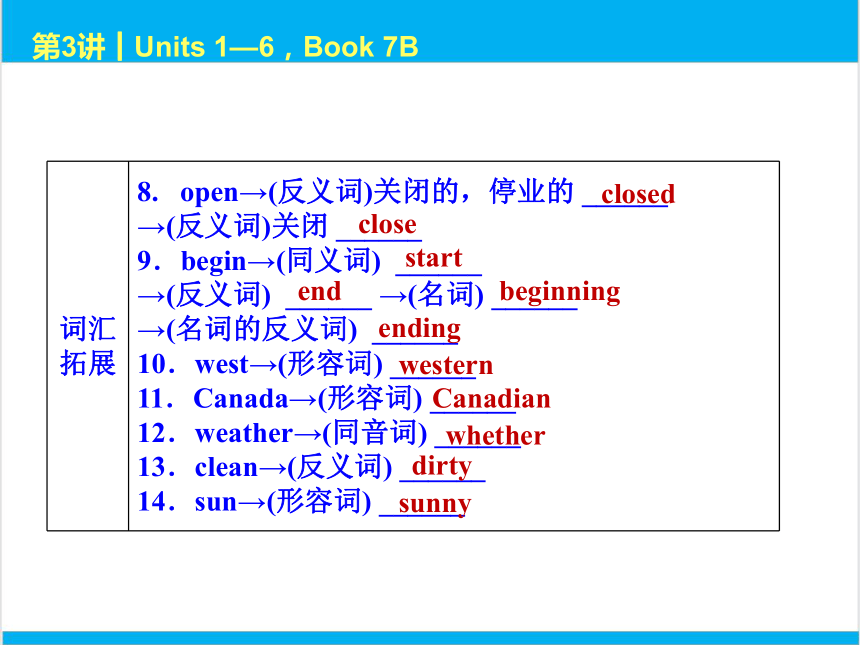
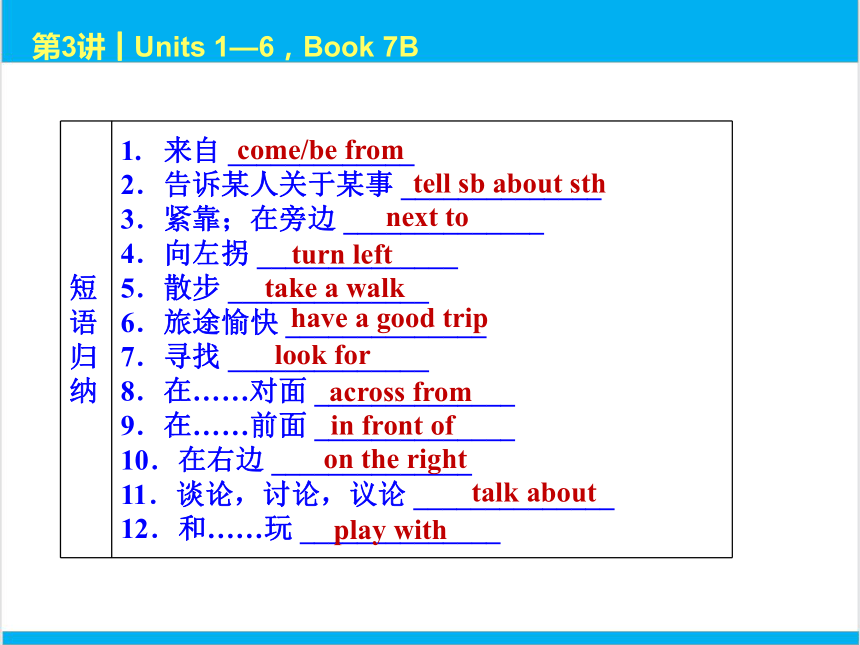
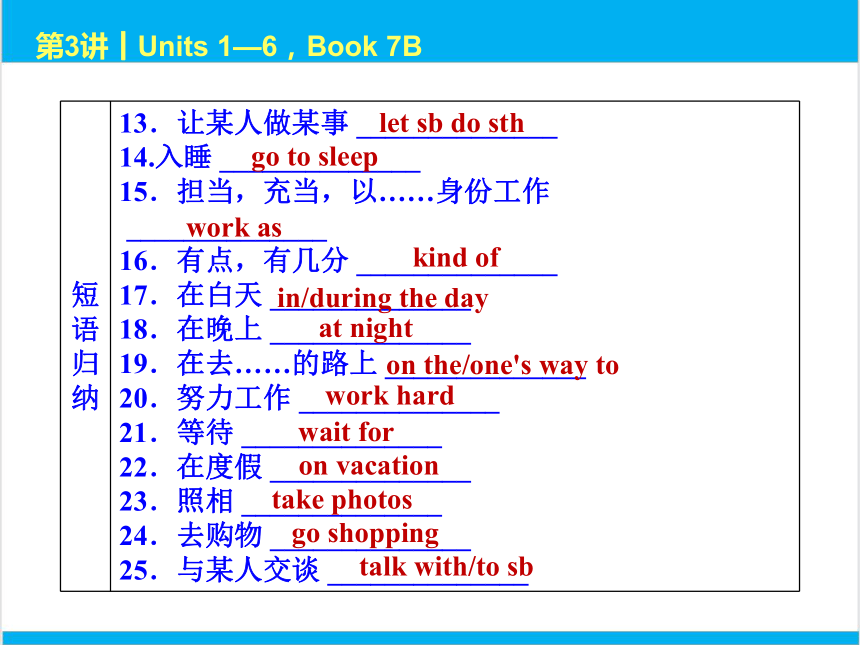
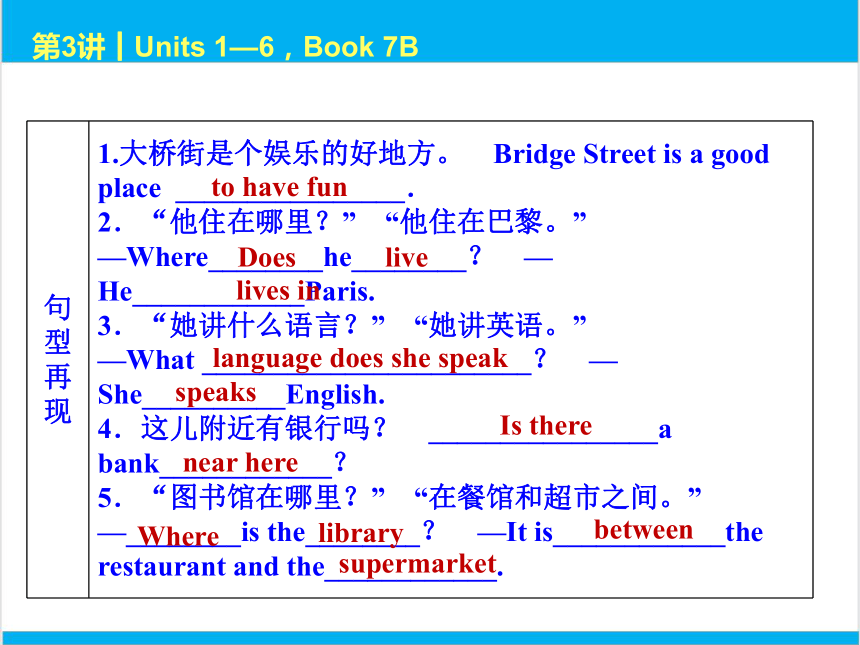
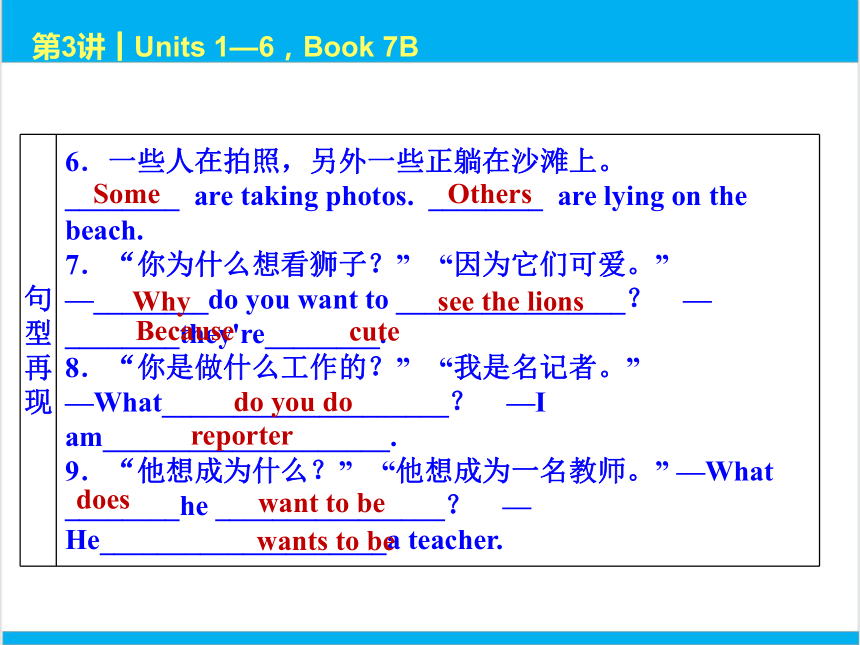
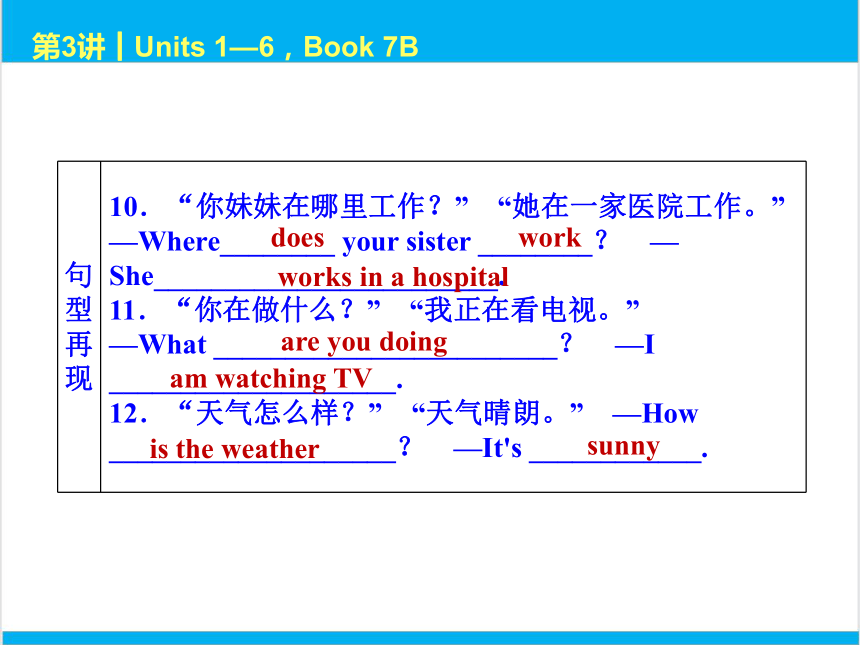
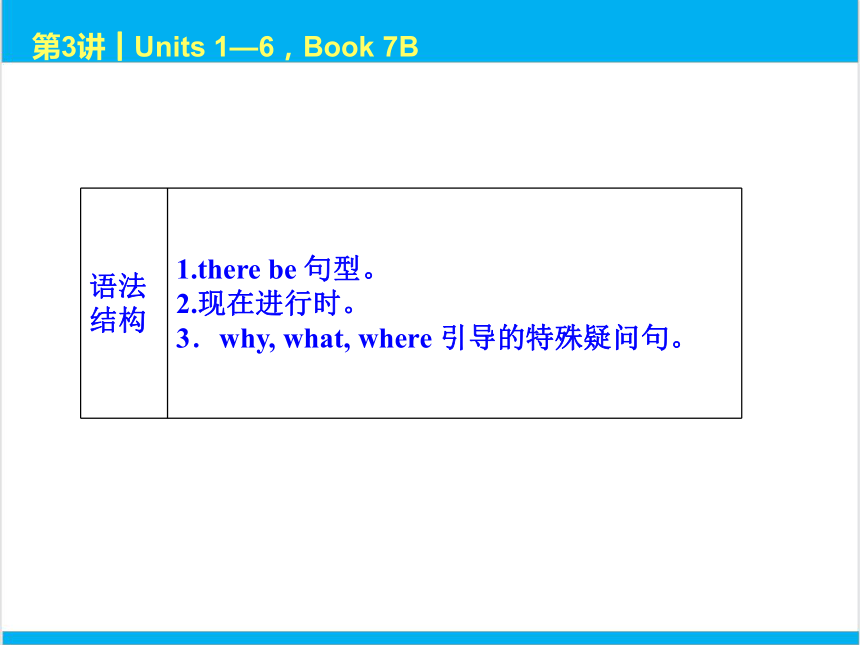
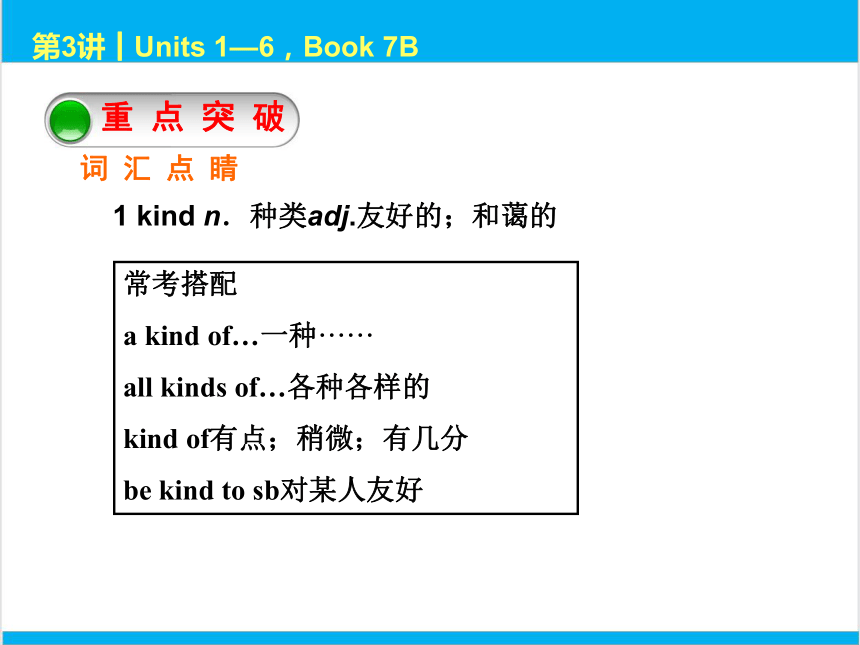
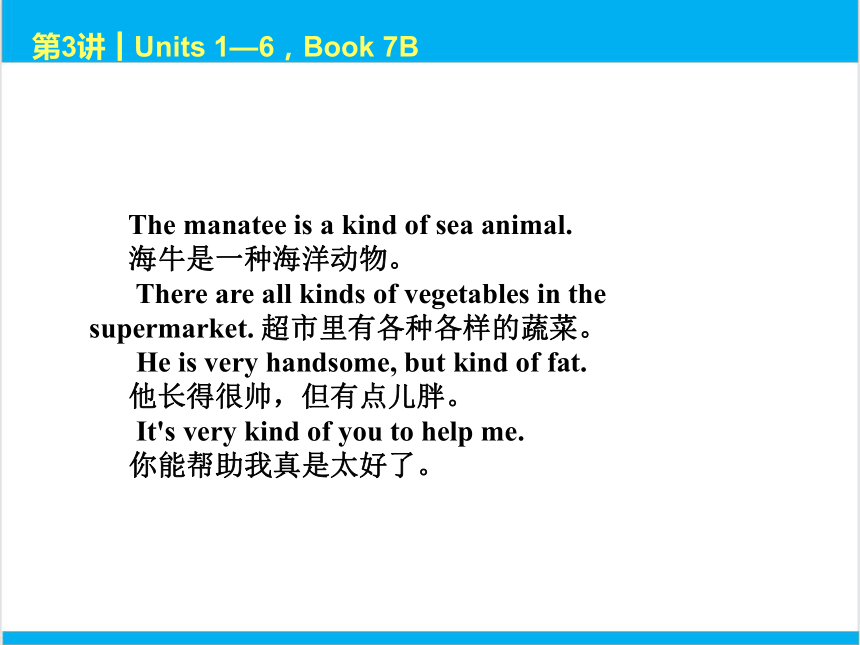
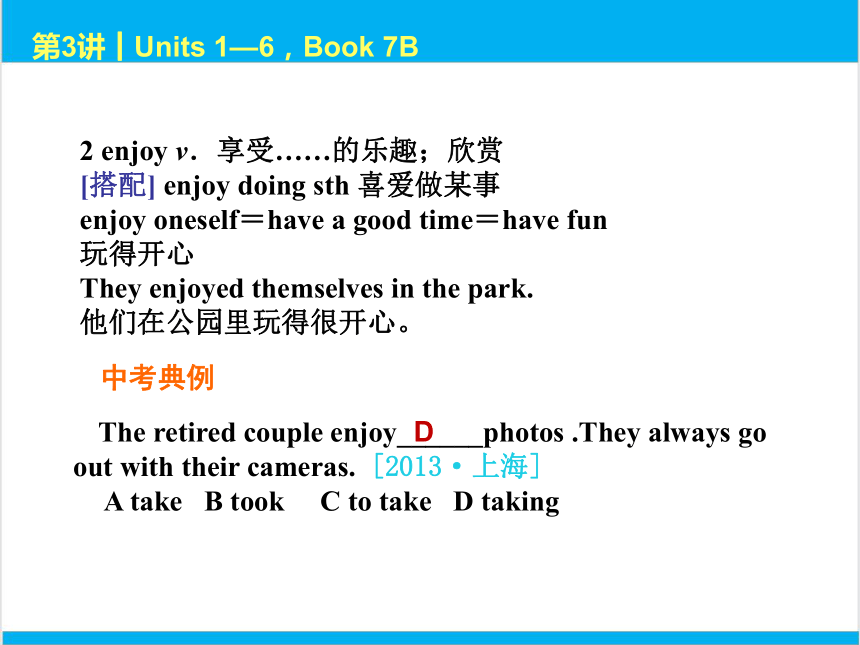
文档简介
(共33张PPT)
第3课时 Units 1—6,Book 7B
第3讲┃Units 1—6,Book 7B
自 学 反 馈
类别 课标考点要求
词汇
拓展 1. across→(动词) ______→(名词) ______
2.sleep→(反义词) ______→(形容词)困倦的 ______
→(形容词)睡着的 ______→(形容词的反义词) ______
3.danger→(反义词) ______→(形容词) ______
→(形容词的反义词) ______
4.hungry→(反义词) ______→(名词) ______
5.beauty→(形容词) ______
→(形容词的反义词) ______
6.visit→(名词) ______
7.center→(形容词) ______
cross
wake
sleepy
asleep
awake
safety
dangerous
safe
full
hunger
crossing
beautiful
ugly
visitor
central
第3讲┃Units 1—6,Book 7B
词汇
拓展 8. open→(反义词)关闭的,停业的 ______
→(反义词)关闭 ______
9.begin→(同义词) ______
→(反义词) ______ →(名词) ______
→(名词的反义词) ______
10.west→(形容词) ______
11.Canada→(形容词) ______
12.weather→(同音词) ______
13.clean→(反义词) ______
14.sun→(形容词) ______
closed
close
start
end
ending
beginning
western
Canadian
whether
dirty
sunny
第3讲┃Units 1—6,Book 7B
come/be from
短语
归纳 1. 来自 _____________
2.告诉某人关于某事 ______________
3.紧靠;在旁边 ______________
4.向左拐 ______________
5.散步 ______________
6.旅途愉快 ______________
7.寻找 ______________
8.在……对面 ______________
9.在……前面 ______________
10.在右边 ______________
11.谈论,讨论,议论 ______________
12.和……玩 ______________
tell sb about sth
next to
turn left
take a walk
have a good trip
look for
across from
in front of
on the right
talk about
play with
短语
归纳 13.让某人做某事 ______________
14.入睡 ______________
15.担当,充当,以……身份工作
______________
16.有点,有几分 ______________
17.在白天 ______________
18.在晚上 ______________
19.在去……的路上 ______________
20.努力工作 ______________
21.等待 ______________
22.在度假 ______________
23.照相 ______________
24.去购物 ______________
25.与某人交谈 ______________
let sb do sth
go to sleep
work as
kind of
in/during the day
at night
on the/one's way to
work hard
wait for
on vacation
go shopping
take photos
talk with/to sb
第3讲┃Units 1—6,Book 7B
第3讲┃Units 1—6,Book 7B
句型
再现 1.大桥街是个娱乐的好地方。 Bridge Street is a good place ________________.
2.“他住在哪里?” “他住在巴黎。”
—Where________he________? —He____________Paris.
3.“她讲什么语言?” “她讲英语。”
—What _______________________? —She__________English.
4.这儿附近有银行吗? ________________a bank____________?
5.“图书馆在哪里?” “在餐馆和超市之间。”
—________is the________? —It is____________the restaurant and the____________.
to have fun
Does
live
lives in
language does she speak
speaks
Is there
near here
library
Where
between
supermarket
第3讲┃Units 1—6,Book 7B
句型
再现 6.一些人在拍照,另外一些正躺在沙滩上。
________ are taking photos. ________ are lying on the beach.
7.“你为什么想看狮子?” “因为它们可爱。”
—________do you want to ________________? —________they're________.
8.“你是做什么工作的?” “我是名记者。”
—What____________________? —I am____________________.
9.“他想成为什么?” “他想成为一名教师。” —What ________he ________________? —He____________________a teacher.
Some
Others
Why
see the lions
cute
Because
do you do
reporter
does
want to be
wants to be
第3讲┃Units 1—6,Book 7B
句型
再现 10.“你妹妹在哪里工作?” “她在一家医院工作。”
—Where________ your sister ________? —She________________________.
11.“你在做什么?” “我正在看电视。”
—What ________________________? —I ____________________.
12.“天气怎么样?” “天气晴朗。” —How ____________________? —It's ____________.
does
work
am watching TV
works in a hospital
are you doing
is the weather
sunny
第3讲┃Units 1—6,Book 7B
语法
结构 1.there be 句型。
2.现在进行时。
3.why, what, where 引导的特殊疑问句。
第3讲┃Units 1—6,Book 7B
词 汇 点 睛
1 kind n.种类adj.友好的;和蔼的
重 点 突 破
常考搭配
a kind of…一种······
all kinds of…各种各样的
kind of有点;稍微;有几分
be kind to sb对某人友好
第3讲┃Units 1—6,Book 7B
The manatee is a kind of sea animal.
海牛是一种海洋动物。
There are all kinds of vegetables in the supermarket. 超市里有各种各样的蔬菜。
He is very handsome, but kind of fat.
他长得很帅,但有点儿胖。
It's very kind of you to help me.
你能帮助我真是太好了。
第3讲┃Units 1—6,Book 7B
2 enjoy v.享受……的乐趣;欣赏
[搭配] enjoy doing sth 喜爱做某事
enjoy oneself=have a good time=have fun
玩得开心
They enjoyed themselves in the park.
他们在公园里玩得很开心。
中考典例
The retired couple enjoy______photos .They always go out with their cameras. [2013·上海]
A take B took C to take D taking
D
第3讲┃Units 1—6,Book 7B
3 give v.授予;给
[点拨] give后可跟双宾语,构成 give sb sth (=give sth to sb)结构,其中,sb 是间接宾语,sth 是直接宾语。当直接宾语是代词时,只能用give sth to sb 结构。
My mother gives me some apples.
=My mother gives some apples to me.
我妈妈给了我一些苹果。
Please give it to me.请把它给我。
(不能说:Please give me it.)
第3讲┃Units 1—6,Book 7B
[拓展] 有类似用法的词还有:
buy sb sth =buy sth for sb
pass sb sth =pass sth to sb
show sb sth =show sth to sb
send sb sth =send sth to sb
第1讲┃Units 1—6,Book 7A
4 lie v.躺;平卧
[点拨] lie作动词,意为“躺”时,其过去式、过去分词和现在分词分别为lay, lain和lying。
The girl is lying on the grass.
这个女孩正躺在草地上。
[拓展](1)lie作“说谎,谎言”讲时,既可作动词,也可作可数名词。lie to sb 向某人撒谎; tell a lie 说谎。
第3讲┃Units 1—6,Book 7B
第3讲┃Units 1—6,Book 7B
(2)lie意为“位于”时,后面接不同的介词表达的含义不同。
由图示可知:
①in 表示在某一地区之内(属于该范围)。
②on 表示与某一地区相邻,两地接壤。
③to 表示在某一地区之外(不属于该范围),且两地不接壤。
第3讲┃Units 1—6,Book 7B
Harbin lies in the north of China.
哈尔滨在中国北部。
Hebei lies on the north of Shandong.
河北在山东北面。
Japan lies to the east of China.
日本在中国的东面。
第3讲┃Units 1—6,Book 7B
1 house/home/family
巧 辩 异 同
(1)house意为“房子”,指居住的建筑物。
(2)home意为“家”,指一家人共同并经常居住的地方,含有“家乡、故乡”的意思,它具有house所没有的感彩(如团聚、思念等)。
(3)family作整体概念的“家庭”讲时,看作单数;作“家庭成员”讲时,看作复数。
Mr Richard's family is very large.
理查德家里的人很多。(单数)
My family are very well.
我家里人身体都很好。(复数)
第3讲┃Units 1—6,Book 7B
2 across/through/over/past/cross
(1)across为介词,表示“从……表面穿过”或者“横穿”,指从某个范围的一边到另一边。across from意为“在……对面”。
He can swim across the river.他能游过这条河。
(2)through为介词,表示“从……中间穿过”,往往指穿过沙漠、森林,(光线)透过窗户等。
The river runs through the city.
这条河从这座城市中间流过。
(3)over为介词,意为“翻越”,表示到达高的障碍物(如树、墙、篱笆和山脉等)的另一侧。
He jumped over the wall. 他跳过了墙。
第3讲┃Units 1—6,Book 7B
(4)past为介词,意为“走过,经过”,指从某物或某人旁边经过。walk/go past=pass。
He walked past me without saying “Hello”.
他没打招呼就从我身边走过去了。
(5)cross为动词,表示“穿过”,相当于go across。
The old man is crossing(=is going across)the road. 这位老人正在过马路。
第3讲┃Units 1—6,Book 7B
中考典例
The old man is good swimmer,and even now he
often swims_______Tuojiang.River after supper. [2013·内江]
A over B through C to D actress
D
第3讲┃Units 1—6,Book 7B
3 wear/put on/dress/in
词性及用法 含义 宾语 其他
wear v.表示
状态 穿着,
戴着 衣服、鞋、帽、围巾、领带、眼镜等 1.put on的反义短语是take off;put on还可表示“上演”,take off也可表示“(飞机)起飞”。
2.be dressed in=be in=be wearing 穿着;get dressed 穿戴好;dress up (as)装扮成
留着 胡须
Put on v.表示动作 穿上,带上 衣服、鞋、帽等
第3讲┃Units 1—6,Book 7B
词性及用法 含义 宾语
dress v.表示 动作 给某人
穿衣服 某人(或自己)
in prep.表示状态 穿着 衣服,颜色
第3讲┃Units 1—6,Book 7B
中考典例
She hurriedly______the child and took him
downstair.[2013·鞍山]
A put on B wore
C dressed D had on
C
dress 强调动作,dress sb 意为“给某人穿衣服”。
解析
第3讲┃Units 1—6,Book 7B
4 between/among
(1)between一般指在两者之间,常与and连用。
(2)among一般用于三者或三者以上的人或物之间。
中考典例
The accident happened______7 pm______9 pm.
[2012·呼和浩特]
A from ; to B between ; to
C from ; and D between ; and
句意:事故发生在晚上7点至9点之间。
解析
D
第3讲┃Units 1—6,Book 7B
5 in front of/in the front of
(1)in front of 指在某个范围外部的前面,其反义词为behind。
(2)in the front of 指在某个范围内部的前面,其反义词组为at the back of。
He took a seat in the front of the cinema.
他在电影院前排位置坐下了。
第3讲┃Units 1—6,Book 7B
中考典例
-Why are you standing , Alice
-I can’t see the blackboard clearly . Two tall boys are sitting ______ me.[2021·广东]
A behind B next to
C between D in front of
由“I can’t see the blackboard clearly.”可知“两个高个子男孩坐在我的前面”。
解析
D
第3讲┃Units 1—6,Book 7B
句 型 透 视
1 This is my new pen pal. She‘s from Australia.这是我 的新笔友。她来自澳大利亚。
[点拨] be from意为“来自于, 是……地方的人”,与 come from同义。
[句型] 询问“某人来自某地”的两个句型:
Where+be +主语+from
Where+do/does+主语+come from
第3讲┃Units 1—6,Book 7B
2 Isn't he cute?难道他不可爱吗?
[点拨] 一般疑问句的否定形式叫否定疑问句,意为“难道不……?”形式上是否定,实际表示肯定意义,表示惊奇、赞许或责备等。答句中Yes译为“不”;No译为“是的”。
—Don't you know her name
难道你不知道她的名字吗?
—Yes, I do.不,我知道。
—No, I don't.是的,我不知道。
注意:(1)句首的助动词与人称保持一致。
(2)答句中的助动词与问句中的助动词保持一致。
(3)Yes或No的回答要保持前后一致。即:Yes后是肯定形式;No后是否定形式。
第3讲┃Units 1—6,Book 7B
3 What do you do?你是做什么工作的?
[句型] 询问某人的职业通常有三种句型:
What +be+主语?
What do/does+主语+do
What's one's job
[拓展] 回答询问职业的句型常用表示职业的名词回答,其构成是在动词词尾加后缀 er/ or。
wait—waiter; work—worker; teach—teacher
sing—singer; clean—cleaner; report—reporter
write—writer; drive—driver; dance—dancer
visit—visitor; act—actor; sail—sailor
还有一种是由“名词+ist”构成。
violin—violinist; journal—journalist
第3讲┃Units 1—6,Book 7B
4 How's the weather in Beijing
北京的天气怎么样?
[点拨] How's the weather?=What's the weather like 常用来询问天气,weather 是不可数名词,不能用a或an修饰。
What fine weather it is! 多好的天气啊!
第3讲┃Units 1—6,Book 7B
[拓展] (1)询问天气情况的常用表达方式还有:
What do you think of the weather
你认为天气怎么样?
—What will the weather be like tomorrow
明天天气怎么样?
—It'll be very cold, but quite sunny.
天气会很冷,但阳光很好。
(2)常见的描述天气的形容词有:windy 刮风的;sunny 晴朗的;rainy 下雨的;snowy 下雪的;fine 晴朗的;warm 暖和的;hot 炎热的;humid 湿热的。
第3讲┃Units 1—6,Book 7B
5 I know you are arriving next Sunday.
我知道你下周日会到达。
[点拨] 句中的“are arriving”表示“将要到达”,这是用进行时表示将来。come, go, leave, fly 等词也有类似用法。
[辨析] arrive, reach 与get to
三者都可表示“到达”。
(1)arrive in +大地点;arrive at +小地点
(2)reach/get to +地点名词
Yesterday they arrived in/reached/got to Shanghai. 他们昨天到达了上海。
注意:arrive 和get 后接地点副词(here/there/home等)时不用加介词。
We got/arrived there last night.
我们昨晚到了那里。
第3课时 Units 1—6,Book 7B
第3讲┃Units 1—6,Book 7B
自 学 反 馈
类别 课标考点要求
词汇
拓展 1. across→(动词) ______→(名词) ______
2.sleep→(反义词) ______→(形容词)困倦的 ______
→(形容词)睡着的 ______→(形容词的反义词) ______
3.danger→(反义词) ______→(形容词) ______
→(形容词的反义词) ______
4.hungry→(反义词) ______→(名词) ______
5.beauty→(形容词) ______
→(形容词的反义词) ______
6.visit→(名词) ______
7.center→(形容词) ______
cross
wake
sleepy
asleep
awake
safety
dangerous
safe
full
hunger
crossing
beautiful
ugly
visitor
central
第3讲┃Units 1—6,Book 7B
词汇
拓展 8. open→(反义词)关闭的,停业的 ______
→(反义词)关闭 ______
9.begin→(同义词) ______
→(反义词) ______ →(名词) ______
→(名词的反义词) ______
10.west→(形容词) ______
11.Canada→(形容词) ______
12.weather→(同音词) ______
13.clean→(反义词) ______
14.sun→(形容词) ______
closed
close
start
end
ending
beginning
western
Canadian
whether
dirty
sunny
第3讲┃Units 1—6,Book 7B
come/be from
短语
归纳 1. 来自 _____________
2.告诉某人关于某事 ______________
3.紧靠;在旁边 ______________
4.向左拐 ______________
5.散步 ______________
6.旅途愉快 ______________
7.寻找 ______________
8.在……对面 ______________
9.在……前面 ______________
10.在右边 ______________
11.谈论,讨论,议论 ______________
12.和……玩 ______________
tell sb about sth
next to
turn left
take a walk
have a good trip
look for
across from
in front of
on the right
talk about
play with
短语
归纳 13.让某人做某事 ______________
14.入睡 ______________
15.担当,充当,以……身份工作
______________
16.有点,有几分 ______________
17.在白天 ______________
18.在晚上 ______________
19.在去……的路上 ______________
20.努力工作 ______________
21.等待 ______________
22.在度假 ______________
23.照相 ______________
24.去购物 ______________
25.与某人交谈 ______________
let sb do sth
go to sleep
work as
kind of
in/during the day
at night
on the/one's way to
work hard
wait for
on vacation
go shopping
take photos
talk with/to sb
第3讲┃Units 1—6,Book 7B
第3讲┃Units 1—6,Book 7B
句型
再现 1.大桥街是个娱乐的好地方。 Bridge Street is a good place ________________.
2.“他住在哪里?” “他住在巴黎。”
—Where________he________? —He____________Paris.
3.“她讲什么语言?” “她讲英语。”
—What _______________________? —She__________English.
4.这儿附近有银行吗? ________________a bank____________?
5.“图书馆在哪里?” “在餐馆和超市之间。”
—________is the________? —It is____________the restaurant and the____________.
to have fun
Does
live
lives in
language does she speak
speaks
Is there
near here
library
Where
between
supermarket
第3讲┃Units 1—6,Book 7B
句型
再现 6.一些人在拍照,另外一些正躺在沙滩上。
________ are taking photos. ________ are lying on the beach.
7.“你为什么想看狮子?” “因为它们可爱。”
—________do you want to ________________? —________they're________.
8.“你是做什么工作的?” “我是名记者。”
—What____________________? —I am____________________.
9.“他想成为什么?” “他想成为一名教师。” —What ________he ________________? —He____________________a teacher.
Some
Others
Why
see the lions
cute
Because
do you do
reporter
does
want to be
wants to be
第3讲┃Units 1—6,Book 7B
句型
再现 10.“你妹妹在哪里工作?” “她在一家医院工作。”
—Where________ your sister ________? —She________________________.
11.“你在做什么?” “我正在看电视。”
—What ________________________? —I ____________________.
12.“天气怎么样?” “天气晴朗。” —How ____________________? —It's ____________.
does
work
am watching TV
works in a hospital
are you doing
is the weather
sunny
第3讲┃Units 1—6,Book 7B
语法
结构 1.there be 句型。
2.现在进行时。
3.why, what, where 引导的特殊疑问句。
第3讲┃Units 1—6,Book 7B
词 汇 点 睛
1 kind n.种类adj.友好的;和蔼的
重 点 突 破
常考搭配
a kind of…一种······
all kinds of…各种各样的
kind of有点;稍微;有几分
be kind to sb对某人友好
第3讲┃Units 1—6,Book 7B
The manatee is a kind of sea animal.
海牛是一种海洋动物。
There are all kinds of vegetables in the supermarket. 超市里有各种各样的蔬菜。
He is very handsome, but kind of fat.
他长得很帅,但有点儿胖。
It's very kind of you to help me.
你能帮助我真是太好了。
第3讲┃Units 1—6,Book 7B
2 enjoy v.享受……的乐趣;欣赏
[搭配] enjoy doing sth 喜爱做某事
enjoy oneself=have a good time=have fun
玩得开心
They enjoyed themselves in the park.
他们在公园里玩得很开心。
中考典例
The retired couple enjoy______photos .They always go out with their cameras. [2013·上海]
A take B took C to take D taking
D
第3讲┃Units 1—6,Book 7B
3 give v.授予;给
[点拨] give后可跟双宾语,构成 give sb sth (=give sth to sb)结构,其中,sb 是间接宾语,sth 是直接宾语。当直接宾语是代词时,只能用give sth to sb 结构。
My mother gives me some apples.
=My mother gives some apples to me.
我妈妈给了我一些苹果。
Please give it to me.请把它给我。
(不能说:Please give me it.)
第3讲┃Units 1—6,Book 7B
[拓展] 有类似用法的词还有:
buy sb sth =buy sth for sb
pass sb sth =pass sth to sb
show sb sth =show sth to sb
send sb sth =send sth to sb
第1讲┃Units 1—6,Book 7A
4 lie v.躺;平卧
[点拨] lie作动词,意为“躺”时,其过去式、过去分词和现在分词分别为lay, lain和lying。
The girl is lying on the grass.
这个女孩正躺在草地上。
[拓展](1)lie作“说谎,谎言”讲时,既可作动词,也可作可数名词。lie to sb 向某人撒谎; tell a lie 说谎。
第3讲┃Units 1—6,Book 7B
第3讲┃Units 1—6,Book 7B
(2)lie意为“位于”时,后面接不同的介词表达的含义不同。
由图示可知:
①in 表示在某一地区之内(属于该范围)。
②on 表示与某一地区相邻,两地接壤。
③to 表示在某一地区之外(不属于该范围),且两地不接壤。
第3讲┃Units 1—6,Book 7B
Harbin lies in the north of China.
哈尔滨在中国北部。
Hebei lies on the north of Shandong.
河北在山东北面。
Japan lies to the east of China.
日本在中国的东面。
第3讲┃Units 1—6,Book 7B
1 house/home/family
巧 辩 异 同
(1)house意为“房子”,指居住的建筑物。
(2)home意为“家”,指一家人共同并经常居住的地方,含有“家乡、故乡”的意思,它具有house所没有的感彩(如团聚、思念等)。
(3)family作整体概念的“家庭”讲时,看作单数;作“家庭成员”讲时,看作复数。
Mr Richard's family is very large.
理查德家里的人很多。(单数)
My family are very well.
我家里人身体都很好。(复数)
第3讲┃Units 1—6,Book 7B
2 across/through/over/past/cross
(1)across为介词,表示“从……表面穿过”或者“横穿”,指从某个范围的一边到另一边。across from意为“在……对面”。
He can swim across the river.他能游过这条河。
(2)through为介词,表示“从……中间穿过”,往往指穿过沙漠、森林,(光线)透过窗户等。
The river runs through the city.
这条河从这座城市中间流过。
(3)over为介词,意为“翻越”,表示到达高的障碍物(如树、墙、篱笆和山脉等)的另一侧。
He jumped over the wall. 他跳过了墙。
第3讲┃Units 1—6,Book 7B
(4)past为介词,意为“走过,经过”,指从某物或某人旁边经过。walk/go past=pass。
He walked past me without saying “Hello”.
他没打招呼就从我身边走过去了。
(5)cross为动词,表示“穿过”,相当于go across。
The old man is crossing(=is going across)the road. 这位老人正在过马路。
第3讲┃Units 1—6,Book 7B
中考典例
The old man is good swimmer,and even now he
often swims_______Tuojiang.River after supper. [2013·内江]
A over B through C to D actress
D
第3讲┃Units 1—6,Book 7B
3 wear/put on/dress/in
词性及用法 含义 宾语 其他
wear v.表示
状态 穿着,
戴着 衣服、鞋、帽、围巾、领带、眼镜等 1.put on的反义短语是take off;put on还可表示“上演”,take off也可表示“(飞机)起飞”。
2.be dressed in=be in=be wearing 穿着;get dressed 穿戴好;dress up (as)装扮成
留着 胡须
Put on v.表示动作 穿上,带上 衣服、鞋、帽等
第3讲┃Units 1—6,Book 7B
词性及用法 含义 宾语
dress v.表示 动作 给某人
穿衣服 某人(或自己)
in prep.表示状态 穿着 衣服,颜色
第3讲┃Units 1—6,Book 7B
中考典例
She hurriedly______the child and took him
downstair.[2013·鞍山]
A put on B wore
C dressed D had on
C
dress 强调动作,dress sb 意为“给某人穿衣服”。
解析
第3讲┃Units 1—6,Book 7B
4 between/among
(1)between一般指在两者之间,常与and连用。
(2)among一般用于三者或三者以上的人或物之间。
中考典例
The accident happened______7 pm______9 pm.
[2012·呼和浩特]
A from ; to B between ; to
C from ; and D between ; and
句意:事故发生在晚上7点至9点之间。
解析
D
第3讲┃Units 1—6,Book 7B
5 in front of/in the front of
(1)in front of 指在某个范围外部的前面,其反义词为behind。
(2)in the front of 指在某个范围内部的前面,其反义词组为at the back of。
He took a seat in the front of the cinema.
他在电影院前排位置坐下了。
第3讲┃Units 1—6,Book 7B
中考典例
-Why are you standing , Alice
-I can’t see the blackboard clearly . Two tall boys are sitting ______ me.[2021·广东]
A behind B next to
C between D in front of
由“I can’t see the blackboard clearly.”可知“两个高个子男孩坐在我的前面”。
解析
D
第3讲┃Units 1—6,Book 7B
句 型 透 视
1 This is my new pen pal. She‘s from Australia.这是我 的新笔友。她来自澳大利亚。
[点拨] be from意为“来自于, 是……地方的人”,与 come from同义。
[句型] 询问“某人来自某地”的两个句型:
Where+be +主语+from
Where+do/does+主语+come from
第3讲┃Units 1—6,Book 7B
2 Isn't he cute?难道他不可爱吗?
[点拨] 一般疑问句的否定形式叫否定疑问句,意为“难道不……?”形式上是否定,实际表示肯定意义,表示惊奇、赞许或责备等。答句中Yes译为“不”;No译为“是的”。
—Don't you know her name
难道你不知道她的名字吗?
—Yes, I do.不,我知道。
—No, I don't.是的,我不知道。
注意:(1)句首的助动词与人称保持一致。
(2)答句中的助动词与问句中的助动词保持一致。
(3)Yes或No的回答要保持前后一致。即:Yes后是肯定形式;No后是否定形式。
第3讲┃Units 1—6,Book 7B
3 What do you do?你是做什么工作的?
[句型] 询问某人的职业通常有三种句型:
What +be+主语?
What do/does+主语+do
What's one's job
[拓展] 回答询问职业的句型常用表示职业的名词回答,其构成是在动词词尾加后缀 er/ or。
wait—waiter; work—worker; teach—teacher
sing—singer; clean—cleaner; report—reporter
write—writer; drive—driver; dance—dancer
visit—visitor; act—actor; sail—sailor
还有一种是由“名词+ist”构成。
violin—violinist; journal—journalist
第3讲┃Units 1—6,Book 7B
4 How's the weather in Beijing
北京的天气怎么样?
[点拨] How's the weather?=What's the weather like 常用来询问天气,weather 是不可数名词,不能用a或an修饰。
What fine weather it is! 多好的天气啊!
第3讲┃Units 1—6,Book 7B
[拓展] (1)询问天气情况的常用表达方式还有:
What do you think of the weather
你认为天气怎么样?
—What will the weather be like tomorrow
明天天气怎么样?
—It'll be very cold, but quite sunny.
天气会很冷,但阳光很好。
(2)常见的描述天气的形容词有:windy 刮风的;sunny 晴朗的;rainy 下雨的;snowy 下雪的;fine 晴朗的;warm 暖和的;hot 炎热的;humid 湿热的。
第3讲┃Units 1—6,Book 7B
5 I know you are arriving next Sunday.
我知道你下周日会到达。
[点拨] 句中的“are arriving”表示“将要到达”,这是用进行时表示将来。come, go, leave, fly 等词也有类似用法。
[辨析] arrive, reach 与get to
三者都可表示“到达”。
(1)arrive in +大地点;arrive at +小地点
(2)reach/get to +地点名词
Yesterday they arrived in/reached/got to Shanghai. 他们昨天到达了上海。
注意:arrive 和get 后接地点副词(here/there/home等)时不用加介词。
We got/arrived there last night.
我们昨晚到了那里。
